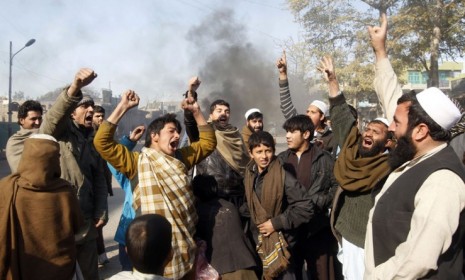The U.S. military's Afghan Koran burnings: 4 consequences
For a second straight day, riots rage in Afghanistan after Muslim holy books are inadvertently burned at a U.S.-run NATO base

A free daily email with the biggest news stories of the day – and the best features from TheWeek.com
You are now subscribed
Your newsletter sign-up was successful
The U.S. locked down its embassy in Kabul on Wednesday as demonstrators shouted "Death to America" and hurled stones to protest the seizing and burning of Muslim holy books. The burning itself took place at a U.S.-run air base in Bagram that is home to the military's massive wartime prison. The Korans were inadvertently sent to an incinerator because they bore extremist inscriptions that prison officials suspected of facilitating communication between prisoners and people on the outside. Though the U.S. has apologized, how will the incident affect the effort to restore security in Afghanistan as the U.S. prepares to withdraw by 2014? Here, four theories:
1. This seriously complicates U.S. relations with Afghanistan
"Afghans won't host the U.S. if troops keep burning their holy books," says Spencer Ackerman at Wired, "especially at their wartime jails." Afghan President Hamid Karzai already wanted the U.S. and NATO to turn this jail over to Afghan control, something the U.S. had promised to do by early last year... until it decided to hold onto the prison. Considering that history, this incident will make dealing with the Afghan government much dicier. Yeah, says Doug Mataconis at Outside the Beltway. The outrage over this case will create "an unnecessary headache for American commanders in a country where the situation is already volatile."
The Week
Escape your echo chamber. Get the facts behind the news, plus analysis from multiple perspectives.

Sign up for The Week's Free Newsletters
From our morning news briefing to a weekly Good News Newsletter, get the best of The Week delivered directly to your inbox.
From our morning news briefing to a weekly Good News Newsletter, get the best of The Week delivered directly to your inbox.
2. America's over-the-top apology may encourage future protests
Marine General John Allen, the top U.S. commander in Afghanistan, says unequivocally that this was not intentional, says Mark Thompson at TIME. "If that's true, why all the fuss?" The U.S. ought to just explain and move on. Instead, within hours of this revelation, Allen posted an apologetic YouTube video and "the Pentagon's PR machine was issuing an apology in Panetta's name." Really, "one wonders if the obsequious response to such a mistake doesn't simply fuel overreaction — by each side — the next time something similar occurs."
3. The hysteria might threaten peace talks
One reason for Allen's aggressive apology, says Allahpundit at Hot Air, might be a fear that the "cultural friction" this incident is causing "could threaten those perpetually on-again-off-again peace talks with the Taliban." Regardless, given the "rampage" the Koran burning has provoked, "the decision to pull out" of Afghanistan soon "is looking better every day, huh?"
A free daily email with the biggest news stories of the day – and the best features from TheWeek.com
4. We'll realize we can never win over the Afghan populace
The lesson here is that in a massive military operation, "screwups happen," says Kevin Drum at Mother Jones. And when they do, they're "routinely used to gin up outrage." How can we convince Afghans to buy into the U.S. vision for their country when something like this "can easily ruin a year's worth of good works?" The answer is, we can't. In the past half-century, the U.S. military has "never successfully won anybody's hearts and minds. It's time to acknowledge this and leave Afghanistan."
-
 Trump wants a weaker dollar but economists aren’t so sure
Trump wants a weaker dollar but economists aren’t so sureTalking Points A weaker dollar can make imports more expensive but also boost gold
-
 Political cartoons for February 3
Political cartoons for February 3Cartoons Tuesday’s political cartoons include empty seats, the worst of the worst of bunnies, and more
-
 Trump’s Kennedy Center closure plan draws ire
Trump’s Kennedy Center closure plan draws ireSpeed Read Trump said he will close the center for two years for ‘renovations’